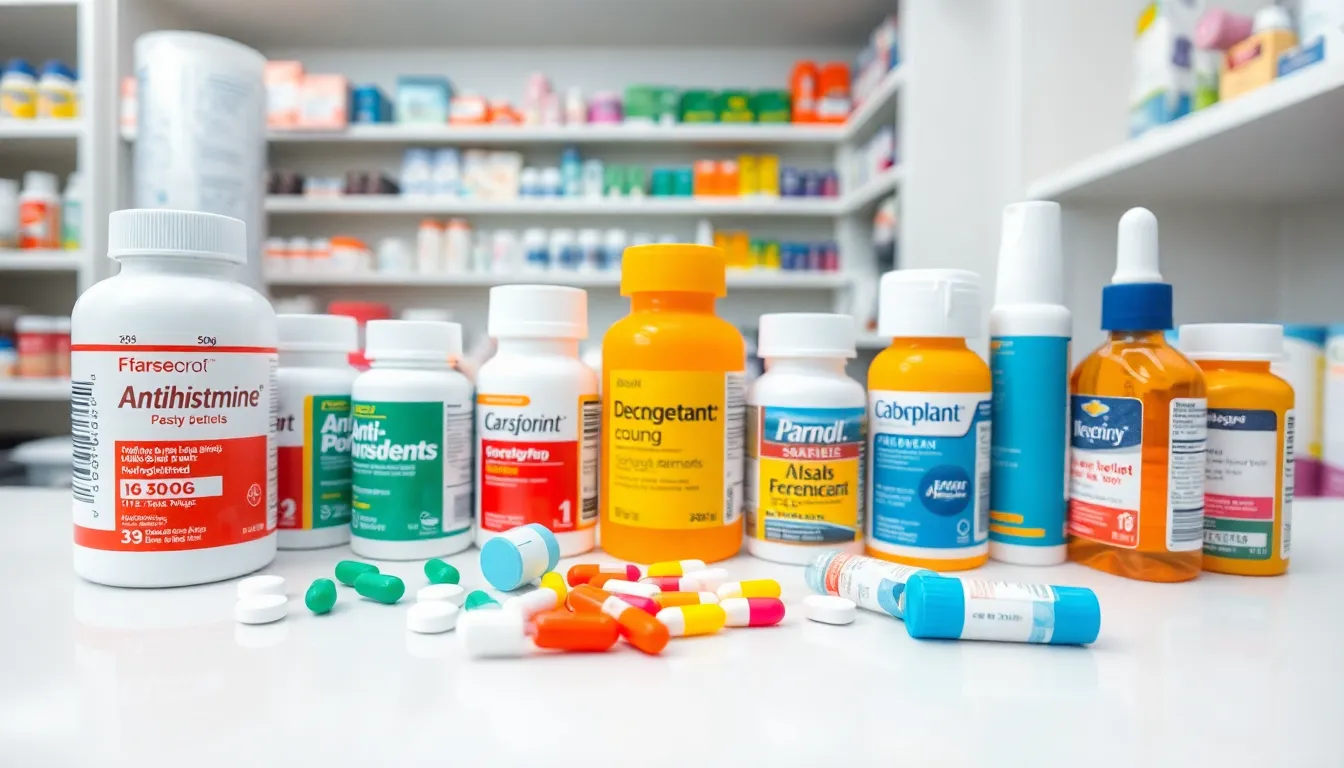Allergic reactions can strike unexpectedly, leaving individuals scrambling for relief. Whether it’s a mild reaction like sneezing and itching or a severe one that poses a serious health threat, knowing what to take can make all the difference. With countless allergens in the environment, from pollen to certain foods, understanding the right treatments is crucial for effective management.
In this guide, readers will discover various options for alleviating allergic reactions. From over-the-counter antihistamines to emergency medications, knowing what to have on hand can empower individuals to respond swiftly. Equip yourself with the knowledge to tackle allergies head-on and regain control of your well-being.
Table of Contents
ToggleUnderstanding Allergic Reactions
Allergic reactions occur when the immune system mistakenly identifies a harmless substance as a threat. Reactions can vary significantly in severity and type.
Common Symptoms
Common symptoms of allergic reactions include:
- Skin Reactions: Hives, rashes, or itching occur frequently, affecting large areas of skin.
- Respiratory Issues: Symptoms like sneezing, nasal congestion, or shortness of breath can signal an allergy to airborne allergens.
- Gastrointestinal Disturbances: Nausea, vomiting, or diarrhea can arise in response to certain foods or medications.
- Anaphylaxis: This severe, life-threatening reaction includes difficulty breathing, swelling in the throat, and a rapid drop in blood pressure.
Types of Allergens
Allergens can be categorized into several groups:
- Pollen: Grasses, trees, and weeds release pollen, triggering seasonal allergies in many individuals.
- Dust Mites: Microscopic organisms found in household dust contribute to indoor allergies.
- Food: Common allergens include peanuts, tree nuts, milk, eggs, soy, wheat, fish, and shellfish.
- Insect Stings: Venom from bees, wasps, and fire ants can provoke severe allergic reactions.
- Medications: Antibodies may react to certain medicines, such as penicillin or sulfa drugs.
- Latex: Natural rubber latex can trigger allergies in sensitive individuals.
Understanding these symptoms and allergens helps individuals recognize allergic reactions and facilitates timely responses.
Over-the-Counter Medications

Over-the-counter (OTC) medications play a crucial role in managing allergic reactions. They provide relief from symptoms and enhance comfort during allergic episodes.
Antihistamines
Antihistamines are effective in blocking histamine, a substance released during allergic reactions. They reduce symptoms like sneezing, itching, and runny nose. Common antihistamines include:
- Diphenhydramine
Provides quick relief but may cause drowsiness. It’s often used for hay fever and allergic reactions.
- Loratadine
Non-drowsy option that works for 24 hours. Ideal for seasonal allergies.
- Cetirizine
Slight sedation possible, effective for both respiratory and skin-related allergic symptoms.
These medications are available as tablets, liquids, and nasal sprays.
Decongestants
Decongestants relieve nasal congestion by shrinking blood vessels in nasal passages. They are beneficial for treating sinus pressure and stuffiness. Common options include:
- Pseudoephedrine
Found in many combination allergy medications, effective for short-term use.
- Phenylephrine
A less effective alternative, often available in store-brand products.
Decongestants are available in oral and nasal spray forms. Caution is advised for individuals with high blood pressure or heart conditions.
Prescription Medications
Prescription medications play a vital role in managing allergic reactions, especially in cases of moderate to severe symptoms. Healthcare professionals often recommend specific treatments tailored to individual needs.
Corticosteroids
Corticosteroids reduce inflammation and immune responses associated with allergic reactions. These medications manage severe symptoms, particularly in conditions like asthma and allergic rhinitis. Common corticosteroids include:
- Prednisone: An oral medication effective for reducing inflammation in severe allergic reactions.
- Hydrocortisone: A topical cream used for skin reactions such as hives or rashes.
- Budesonide: An inhaled corticosteroid for managing asthma symptoms triggered by allergens.
Healthcare providers prescribe corticosteroids based on the severity of the reaction and the patient’s medical history.
Epinephrine Auto-Injectors
Epinephrine auto-injectors provide immediate relief for severe allergic reactions, particularly anaphylaxis. These devices deliver a dose of epinephrine to counteract life-threatening symptoms. Key aspects include:
- Instant action: Epinephrine constricts blood vessels, opens airways, and reduces swelling.
- Immediate accessibility: Patients typically carry auto-injectors, such as the EpiPen, for emergencies.
- Proper use: It’s crucial to follow instructions for administering the injection promptly during an allergic emergency.
Healthcare professionals often emphasize the necessity of carrying an epinephrine auto-injector for individuals with known severe allergies.
Natural Remedies
Natural remedies can provide significant relief for allergic reactions. Many individuals seek alternative options alongside traditional treatments to alleviate symptoms and enhance overall well-being.
Herbal Supplements
Herbal supplements can offer support in managing allergic reactions. Some commonly used options include:
- Butterbur: Effective in reducing allergy symptoms such as nasal congestion and sneezing, this herb may block histamine.
- Quercetin: A flavonoid found in various plants, it possesses antihistamine properties that may decrease inflammation and stabilize mast cells.
- Nettle: Often used for its anti-inflammatory effects, nettle may alleviate hay fever symptoms and alleviate nasal congestion.
- Echinacea: Known for its immune-boosting effects, echinacea may help reduce the severity and duration of allergic reactions.
- Ginger: An anti-inflammatory agent, ginger may aid in reducing respiratory symptoms associated with allergies.
Dietary Considerations
Dietary choices may influence allergic reactions positively. Incorporating certain foods can enhance immune response or reduce symptoms:
- Omega-3 Fatty Acids: Found in fatty fish, flaxseeds, and walnuts, these acids help decrease inflammation and may improve allergy symptoms.
- Probiotics: Present in yogurt and fermented foods, probiotics support gut health and may modulate immune responses related to allergies.
- Fruits and Vegetables: Rich in antioxidants and vitamins, items like berries, citrus fruits, and leafy greens bolster immune health, potentially lowering allergy severity.
- Spices: Turmeric and garlic possess anti-inflammatory properties that may help calm allergic reactions.
- Avoidance of Certain Foods: Identifying and avoiding trigger foods can prevent allergic reactions from worsening.
Integrating these natural remedies may enhance the effectiveness of conventional treatments and provide additional comfort during allergic episodes.
When to Seek Medical Attention
Individuals should seek medical attention for allergic reactions under specific circumstances. Signs of a severe reaction, or anaphylaxis, include difficulty breathing, swelling in the throat, a rapid heartbeat, and a drastic drop in blood pressure. These symptoms require immediate emergency care.
Patients with persistent symptoms that don’t improve after using OTC medications should consult healthcare providers. Symptoms such as ongoing hives, intense itching, or skin rashes warrant professional evaluation to determine underlying causes and appropriate management.
Those experiencing gastrointestinal issues, like severe nausea or vomiting, accompanied by dehydration signals a need for medical intervention. If swelling occurs in the face, tongue, or lips, medical assistance is essential.
Finally, individuals with a known history of severe allergies should always carry an epinephrine auto-injector. In case of accidental exposure to allergens or sudden symptoms, using the auto-injector and seeking immediate medical help is crucial.
Understanding how to manage allergic reactions is crucial for maintaining health and well-being. With a range of options available from over-the-counter antihistamines to prescription medications and natural remedies, individuals can find effective ways to alleviate symptoms. Recognizing the signs of severe reactions and knowing when to seek medical help can make all the difference in critical situations.
By being proactive and informed about their allergies, individuals empower themselves to respond swiftly to unexpected events. Whether it’s carrying an epinephrine auto-injector or incorporating dietary changes, taking these steps can significantly improve their quality of life.





